Groundwater Resources -> matter
Matter
Matter is anything that takes up space and has mass. It is the "stuff" that makes up the universe, and it can exist in different states: solid, liquid, or gas.
Properties of Matter
Matter has various properties that help us identify and classify it. These properties include:
- Mass: the amount of matter in an object
- Volume: the amount of space that matter occupies
- Density: the mass of a substance per unit volume
- States of Matter: solid, liquid, gas
- Physical Properties: color, texture, shape, etc.
States of Matter
Matter can exist in three main states:
- Solid: In a solid, the particles are tightly packed together and vibrate in place. Solids have a definite shape and volume.
- Liquid: In a liquid, the particles are still close together, but they can move around each other. Liquids have a definite volume but take the shape of their container.
- Gas: In a gas, the particles are far apart and move freely. Gases have neither a definite shape nor a definite volume.
Changes in Matter
Matter can undergo physical and chemical changes:
- Physical Change: A change in the form or state of matter without a change in its chemical composition. Examples include melting, freezing, and dissolving.
- Chemical Change: A change in the chemical composition of matter, resulting in the formation of new substances. Examples include burning, rusting, and cooking.
Study Guide
To study matter, it's important to understand its properties, states, and changes. Here are some key points to focus on:
- Define matter and its properties.
- Describe the three states of matter and their characteristics.
- Differentiate between physical and chemical changes in matter.
- Provide examples of each state of matter and different changes in matter.
[Matter] Related Worksheets and Study Guides:
.◂Science Worksheets and Study Guides Sixth Grade. Groundwater Resources
Study Guide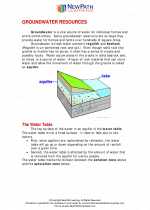 Groundwater Resources
Groundwater Resources  Worksheet/Answer key
Worksheet/Answer key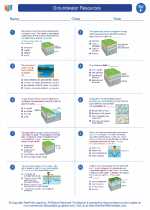 Groundwater Resources
Groundwater Resources  Worksheet/Answer key
Worksheet/Answer key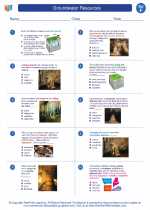 Groundwater Resources
Groundwater Resources  Worksheet/Answer key
Worksheet/Answer key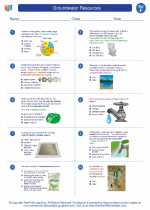 Groundwater Resources
Groundwater Resources  Vocabulary/Answer key
Vocabulary/Answer key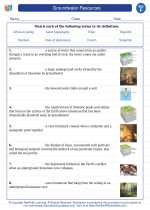 Groundwater Resources
Groundwater Resources  Vocabulary/Answer key
Vocabulary/Answer key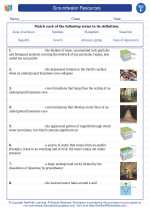 Groundwater Resources
Groundwater Resources 

 Worksheet/Answer key
Worksheet/Answer key
 Worksheet/Answer key
Worksheet/Answer key
 Worksheet/Answer key
Worksheet/Answer key
 Vocabulary/Answer key
Vocabulary/Answer key
 Vocabulary/Answer key
Vocabulary/Answer key

The resources above cover the following skills:
EARTH AND SPACE SCIENCE
Earth’s Systems
Use research-based evidence to propose a scientific explanation regarding how the distribution of Earth’s resources such as minerals, fossil fuels, and groundwater are the result of ongoing geoscience processes (e.g., past volcanic and hydrothermal activity, burial of organic sediments, active weathering of rock).